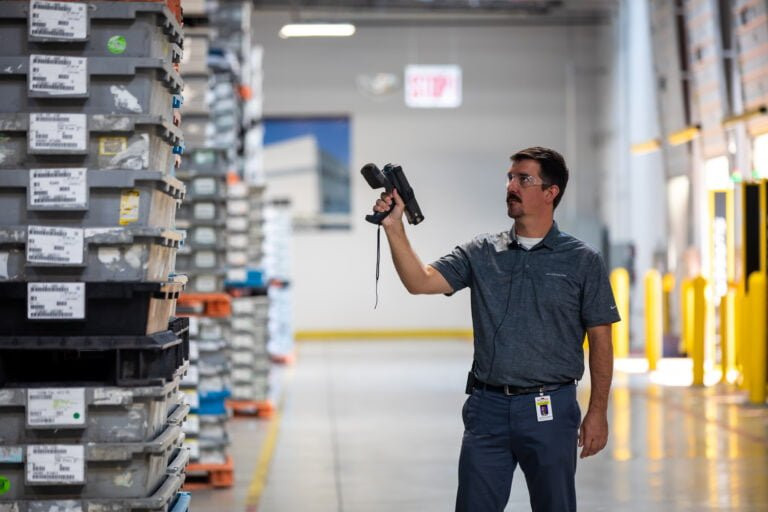Digitalisation and innovation are set to be critical to the future of airfreight and logistics, from mitigating disruption to fostering sustainability.
For Surgere’s IoT-driven, AI-powered supply chain business, this means handling around 15 billion transactions a month, generating vast amounts of data. To best manage this data and enable its customers to derive meaningful insights, Surgere integrates artificial intelligence (AI) into its services to support data capture and analysis, as well as helping users navigate the information overload.
Part of that strategy involves demystifying AI and clearly demonstrating the benefits it can have for supply chains, says Surgere CEO William Wappler.
“If we can break down the complexity, people and companies will be more willing to embrace it,” Wappler said. “They’ll realise that they have been complicating their tasks by avoiding technological solutions. Understanding and simplifying the concept of technology can significantly enhance its acceptance and utilisation.”
Surgere’s role is to provide accurate information to air cargo stakeholders, he said, as this foundational data is vital for everyone involved. The company’s approach is to leverage AI to be more accessible and transformative throughout the supply chain, building new capabilities to enhance data utilisation and eventually integrate it into everyday conversations.
“This phased, step-by-step process makes AI less intimidating and more accessible, transforming it into a helpful tool rather than a scary, unknown entity,” Wappler said.
Integrating Tools to Improve Predictability
Surgere’s focus involves embracing technology to build cooperative, data-sharing communities, leading to improved operations and profitability in air cargo and beyond. As AI is integrated and optimisation benefits are recognised, companies will see enhanced communities, and air cargo operations will improve, not diminish, through this collective intelligence.
“The future is promising because expedited services won’t disappear; rather, they will become more efficient. Instead of solving last-minute emergencies, which is common now, we can use AI to manage and optimise outcomes collectively ahead of any unfortunate issues,” Wappler said.
Wappler added that technology is already significantly improving the air cargo industry’s ability to manage unforeseen circumstances, particularly within the manufacturing and distribution environments. But of course, there remain larger, unpredictable events that technology can’t foresee.
“No one predicted the tsunami that hit Japan, the ice storm that took out a chip facility in Houston, the pandemic, or the current difficulties in moving waterborne cargo through the Middle East,” Wappler said. “These events create massive disruptions in our supply chains that we simply cannot predict. And this is where air cargo plays a crucial role. Its significance lies not just in resolving production or distribution issues but in addressing these larger, unforeseeable disruptions. Air cargo’s ability to adapt and respond to these larger disruptions will continue to be essential in the future.”
Next generation
Surgere’s approach to navigating the digitisation of air cargo involves more than just deploying the right tools. According to Wappler, employees entering the workforce today expect that their work will have a meaningful impact on the world. For them, innovation is not just a buzzword; it’s a crucial metric that defines them.
“They want their work, whether it’s coding or application management, to contribute to the betterment of society, the environment, or the world at large,” Wappler said. “I see this mindset reflected in their activities, whether it’s at food banks or helping veterans. Employees today expect their professional lives to align with their personal values, and they want their work to make a positive impact.”
The bigger picture
When Surgere was founded, its mission was straightforward: collect accurate data with high fidelity, meaning they only gathered the data they needed and excluded irrelevant information.
Today, the approach has evolved beyond data collection, utilising new tools to anticipate future needs. The company believes that air cargo stakeholders don’t want to take incremental steps that might later prove counterproductive. Instead, they need solutions that consider the long-term objectives from the outset.
“We continue to understand our clients’ end-to-end strategies and desired outcomes, which allows us to design and implement steps appropriately, ensuring that every step supports the final goal,” Wappler said. “We call this approach ‘technology confluence,’ which involves integrating various technologies—passive or active RFID, Bluetooth, ultra-wideband GPS—within an AI environment.”
This integration helps Surgere create an initial step that aligns with the final objective, with a focus on engineering and solution design using technology effectively at each stage.
Looking ahead, Wappler said that considering future technologies and how they can impact the company’s strategy is essential.
“We are constantly thinking about future technologies, like biological design chips and faster computing because the current technology might not be able to handle the data demands of widespread AI adoption,” Wappler said. “If we deploy AI extensively, we need to ensure our technology can handle these demands without breaking down. We still have significant work ahead to achieve this—and we’re ready for it.”




